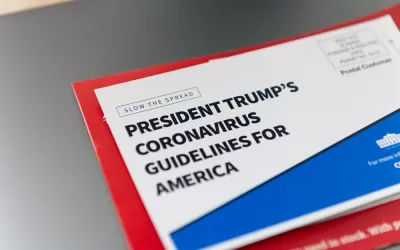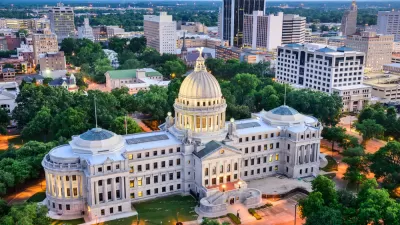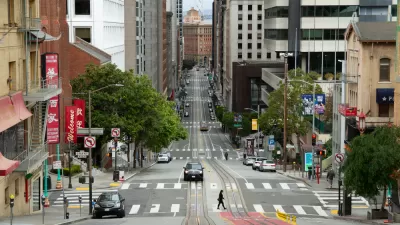Public health experts were pleased that Trump extended his coronavirus guidelines, but they remain advisory, left to state and local governments to implement. Nine states have yet to issue stay-at-home orders, leaving the nation vulnerable to COVID.

Anand Parekh, the Bipartisan Policy Center's public health expert and former U.S. Department of Health and Human Services deputy assistant secretary who helped lead the Obama administration's response to swine flu, avian flu, and the Ebola outbreaks, was asked by MSNBC's Craig Melvin on Monday morning about what the federal response should be for Michigan which is preparing for a crush of coronavirus patients. After emphasizing the importance of logistics in getting the hospital equipment to where it was needed, he added:
For all the other states that are not a Michigan, a Louisiana, a New York, there is one more very important thing than President Trump can do in the next hour as he speaks with all 50 governors (via conference call.)
Right now, more than 20 states that have not issued a stay-at-home order. This is absolutely critical. The figures that we have seen over the weekend, 80,000 to 100,000 lives that may be lost, presuppose that in the next couple of days, every single governor issue a stay at home order.
If we don't do anything for every one individual who has the virus, they will transmit it to two or three individuals.
So the most important thing to do to save lives in terms of the federal response, #1: For Michigan, Louisiana and New York, getting them the critical medical material they need, and #2: Making sure all 20 governors that have not yet issued a stay-at-home order, do so within the next 24-48 hours.
On Monday, the governors of Virginia and Maryland and the mayor of the District of Columbia did issue stay-at-home orders, leaving 19 states without such orders that apply statewide.
At the White House Coronavirus Task Force press conference held at 5 pm, the president was asked by a reporter, "Are you if considering a nationwide stay-at-home order? I know there’s a lot of states that have put them in place, but some haven’t."
Trump responded:
"Well, we’ve talked about it. Obviously, there are some parts of the country that are in far deeper trouble than others. There are other parts that, frankly, are not in trouble at all...If we do that, we will let you know, but it’s pretty unlikely, I would think, at this time."
Dr. Deborah Birx, a public health expert on the task force, responded to the reporter's second question, essentially contradicting the president's assertion that "some parts of the country are in no trouble at all," and confirming Dr. Parekh's assertion that the models predicting what deaths to expect were based on all states following social distancing principles.
"[T]hat’s why we really believe this needs to be federal guidance, so that every state understands that it may look like two [COVID] cases today — that become 20, that become 200, that become 2,000. And that’s what we’re trying to prevent.. so we really do recommend that every governor, every mayor looks very carefully and ensures that their communities are utilizing these guidance."
In the source article, Peter Sullivan writes in The Hill that the "hold-out" governors are facing pressure to issue the orders.
Dr. Scott Gottlieb, President Trump’s former Food and Drug Administration commissioner, issued warnings to Texas and Florida on Sunday.
“Texas may have a very narrow window to take tougher action to avert a bad outcome with #COVID19,” he wrote on Twitter. “Building case counts in Dallas and other Texas cities, and a slow state response, are a dangerous harbinger that things could soon explode in that state.”
In Florida, which Gottlieb warned could become a “major epicenter,” Gov. Ron DeSantis (R) on Monday did issue a stay-at-home order for four counties in South Florida, but not for the entire state.
Sullivan notes that Arizona Gov. Doug Ducey (R) followed in the footsteps of Mississippi Gov. Tate Reeves (R) and "issued an executive order restricting the ability of localities to tell people to stay home without the state’s approval and classifying a wide range of businesses, including barber shops and salons, as 'essential' businesses that should remain open."
“What we are seeing is definitely a varying response across the states,” said Jennifer Tolbert, director of state health reform at the Kaiser Family Foundation. How those different policies fared will no doubt be analyzed when virus has been contained.
Florida Gov. Ron DeSantis (R) issued a statewide stay-at-home order on April 1, after heavy criticism, as did Republican governors Brian Kemp of Georgia, Tate Reeves of Mississippi, and Gregg Abott of Texas.
Related in Planetizen:
-
Mississippi Governor First to Preempt Local Stay-at-Home Orders, March 30, 2020
FULL STORY: Holdout governors face pressure to issue stay-at-home orders

Planetizen Federal Action Tracker
A weekly monitor of how Trump’s orders and actions are impacting planners and planning in America.

Congressman Proposes Bill to Rename DC Metro “Trump Train”
The Make Autorail Great Again Act would withhold federal funding to the system until the Washington Metropolitan Area Transit Authority (WMATA), rebrands as the Washington Metropolitan Authority for Greater Access (WMAGA).

DARTSpace Platform Streamlines Dallas TOD Application Process
The Dallas transit agency hopes a shorter permitting timeline will boost transit-oriented development around rail stations.

Renters Now Outnumber Homeowners in Over 200 US Suburbs
High housing costs in city centers and the new-found flexibility offered by remote work are pushing more renters to suburban areas.

The Tiny, Adorable $7,000 Car Turning Japan Onto EVs
The single seat Mibot charges from a regular plug as quickly as an iPad, and is about half the price of an average EV.

Supreme Court Ruling in Pipeline Case Guts Federal Environmental Law
The decision limits the scope of a federal law that mandates extensive environmental impact reviews of energy, infrastructure, and transportation projects.
Urban Design for Planners 1: Software Tools
This six-course series explores essential urban design concepts using open source software and equips planners with the tools they need to participate fully in the urban design process.
Planning for Universal Design
Learn the tools for implementing Universal Design in planning regulations.
Municipality of Princeton
Roanoke Valley-Alleghany Regional Commission
City of Mt Shasta
City of Camden Redevelopment Agency
City of Astoria
Transportation Research & Education Center (TREC) at Portland State University
US High Speed Rail Association
City of Camden Redevelopment Agency
Municipality of Princeton (NJ)





























